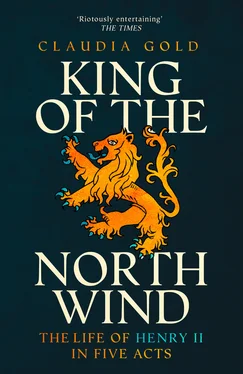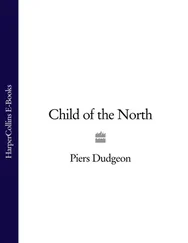Whether Eleanor, aged twenty-nine, thought that the eighteen-year-old Henry’s mind resembled that of Aristotle – the apotheosis of mid-twelfth-century intellectual aspiration – and was sufficiently aroused to ‘shatter the Commandments’ there and then, we shall never know.
The chronicler Walter Map’s Eleanor is a seductress, casting her ‘unchaste eyes’ – oculos incestos – upon him. ‘Unchaste’ is the kindest interpretation; the word has underlying meanings of impure, immoral, dirty, or even incestuous. Walter accused Eleanor of not only snaring Henry in Paris, but of sleeping with his father, which would have made her marriage to Henry incestuous. *
In truth, we know very little about Eleanor. We do know that she was clever, powerful and possibly beautiful – a ‘woman without compare’. We also know that Eleanor cared deeply for Aquitaine, the vast lands in the south-west of France that had been bequeathed to her by her father.
Eleanor had brought Louis and the French crown the incredible riches of Aquitaine. And yet married to Louis, she had enjoyed little autonomy. In the few surviving charters, Eleanor rarely acts alone – only jointly with Louis. There was a brief flurry of activity in the period before they departed on crusade, but after their return, when divorce appeared inevitable, Eleanor was further sidelined.
Henry was attractive, clever and bold. He was a soldier, a diplomat, charismatic, educated and ambitious for power; people flocked to him ‘even though they had scrutinised him a thousand times before’. Through his mother Matilda, he held the possibility of inheriting the English throne, if he could only overthrow his usurper cousin King Stephen. Through his father, he was heir to much of northern France. In August 1151, Henry was a man with a glittering future.
Sources do not tell us if the bargain they struck at that first meeting in Paris was at Eleanor’s or Henry’s instigation. Nor do they reveal the precise terms of the bargain, or even whether they were explicit or implicit. But bargain there must have been.
For what if, in return for the advantages he would gain from their marriage, Henry had promised Eleanor something that Louis never had, and never would have, given her: the chance to rule her own duchy as she chose, under the loose auspices of Henry’s domains?
One thing is for sure: a promise of this potency – a promise made to a woman desperate for the independence that power confers – once given, is best kept.
I
Henry’s story began with a drunken party, a dare, and a shipwreck. It was 1120, thirteen years before his birth, and thirty-one years before he met Eleanor. On a bitterly cold day, 25 November, a large party of the Anglo-Norman elite gathered at the town of Barfleur on the coast of northern France. They were led by Henry’s grandfather, King Henry I of England and Duke of Normandy, and his only legitimate son, the seventeen-year-old William Atheling. The royal pair were on their way back to England from war with Louis VI (the Fat) of France and King Henry’s nephew, William Clito, for control of Normandy. They were in exuberant spirits because they had won.
The party was to sail that night and conditions were perfect. The sky was cloudless, the sea was calm, the moon was in its first quarter but the stars were brilliant.
Prince and king were to travel separately. King Henry had been approached by the owner of a handsome new white ship. His name was Thomas FitzStephen and, during a conversation with the king, Thomas reminded him that it was his father who had carried Henry I’s own father, William the Bastard (or Conqueror), from France to England and conquest in 1066. Now he asked for the honour of taking Prince William Atheling across the Channel in his new ship.
William was impressed. The ship was modern and fast, and he was convinced it would outrun his father’s older and heavier vessel, the Esnecca (the snake, or fast warship).
The ship’s fifty oarsmen were delighted to carry William; the young prince, at their request, ordered the entirety of the town’s wine to be loaded on board.1
Throughout the long winter evening, the 300 or so travellers embarked. They numbered William’s bastard half-siblings Richard, and Matilda countess of Perche, most of his aristocratic friends, and many of their parents. William was in a celebratory mood. Not only had he defeated his enemies; just five months before arriving at Barfleur, he had married Matilda of Anjou at Lisieux to form an alliance with Count Fulk V of Anjou, whose territory bordered Normandy to the south. †His victory was secure. With the alcohol on board, the Norman chronicler Orderic Vitalis tells us, the party began. The oarsmen and many of the passengers quickly became drunk. When the priests arrived to bless the ship before its crossing, they were teased and sent away.2 The mood on the ship was so raucous that some of the passengers got off rather than risk the crossing. Among those who left was William’s first cousin, Stephen, son of the king’s sister Adela, who pleaded diarrhoea rather than travel with the prince. Henry I had created him, a beloved nephew, count of Mortain.
King Henry’s ship departed first. The crossing had to be made at night, in high water, or the boats would not have been able to float. We know that on 25 November 1120 high water was at 10.43 p.m.3 The White Ship left the harbour perhaps an hour later. By now nearly everyone on board, probably including the captain, was drunk. Thomas FitzStephen was persuaded to take a dare from the prince and his friends to out-race King Henry’s ship, despite its head start. He was an experienced sailor who had made the journey from Barfleur to England numerous times. He possibly felt himself to be so familiar with the route that extra speed, despite the jagged rocks that dotted the outskirts of the harbour, would not matter. Perhaps he was so wine-soaked that all caution was disregarded. Or perhaps he was coerced by his drunken master. The White Ship hurtled out of the harbour’s mouth and almost immediately hit a rock, probably the Quilleboeuf Rock or Raz de Barfleur, which knifed through its planks.
The sailors desperately tried to free the boat, but it suddenly overturned. The night was freezing and the waters dark. From the shore, the clergymen whose traditional blessing the travellers had drunkenly jeered, heard the petrified screams of the foundering passengers. The bishop of Coutances was among the clerical witnesses. All three of his nephews and his brother were on board.
The situation was ghastly for the hundreds of souls perishing in the bitter winter seas, but it was not yet a disaster for the Norman dynasty. William still might have escaped. He was bundled into a lifeboat and swiftly steered away. But the prince had humanity. William was close to his illegitimate half-brothers and sisters, who had been given lands and titles by their father. He evidently loved his half-sister the countess of Perche and his brother Richard. He ordered his tiny vessel to go back and rescue them. As it reached the wreck, it was engulfed by the scores of panicked people who tried to climb aboard. The boat capsized and they too drowned. William Atheling, heir to England and Normandy, was dead.
It seemed there would be three survivors of the tragedy: Berold, a butcher from Rouen; a son of the nobleman Gilbet l’Aigle; and the captain, Thomas FitzStephen. Berold and l’Aigle’s son managed to grab hold of a piece of the wreckage and stay afloat. Thomas fought his way through the freezing waters and asked them for news. When they told him William was dead, unable to face the king, he slipped down into the sea to die. And when l’Aigle’s son could hold on no longer, he too drowned. Only Berold the butcher, kept from freezing in the water by his pelisse and his sheepskin coat, lived to bear witness. In the morning, he was rescued by three fishermen.
Читать дальше












